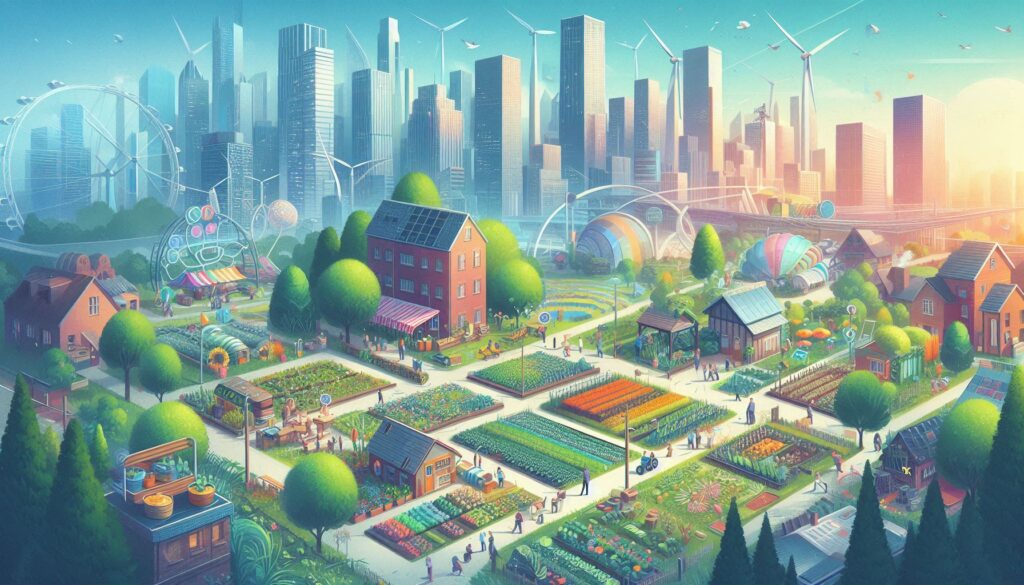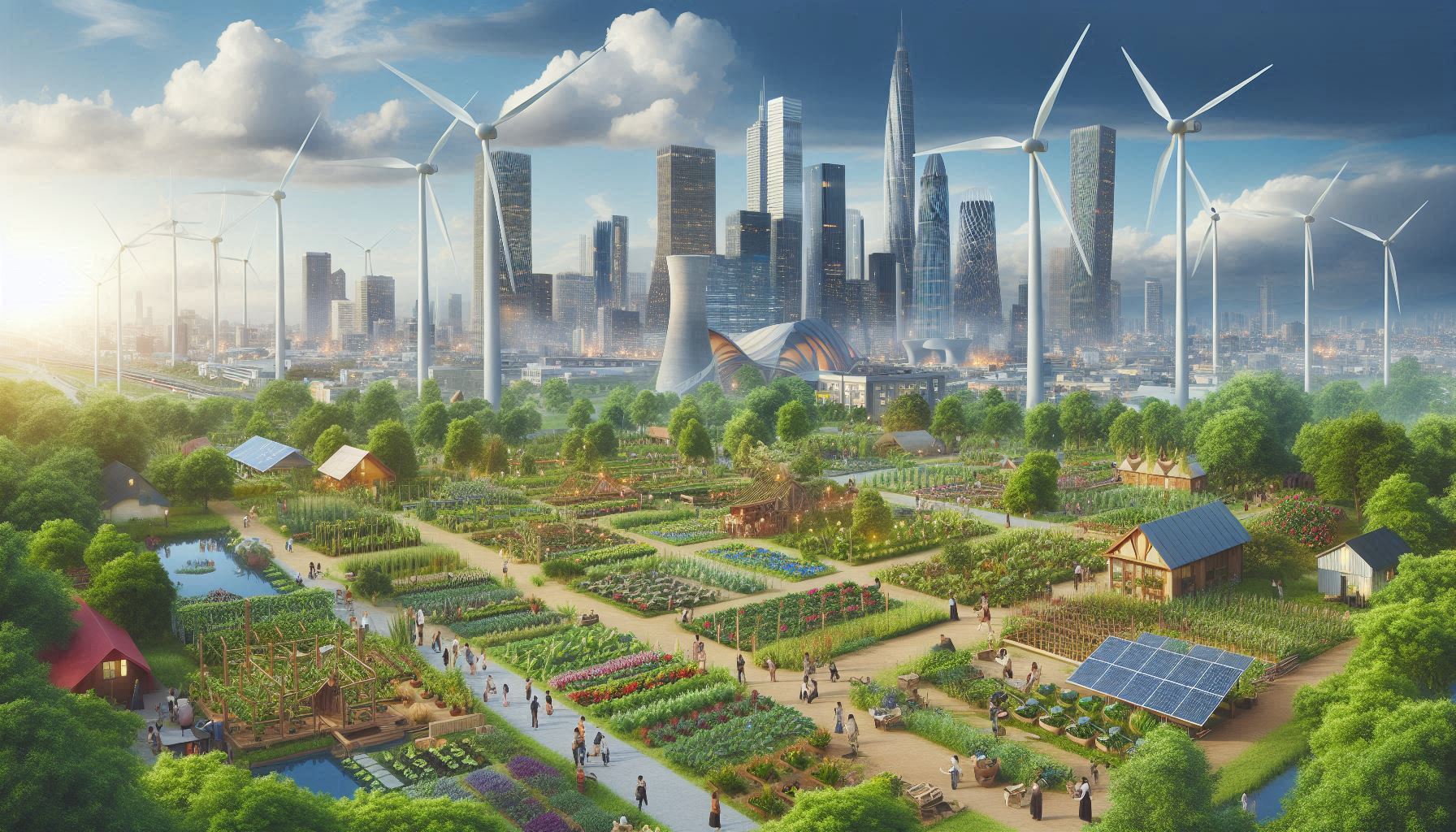Community gardens have long been recognized as powerful tools for promoting sustainability, resilience, and social cohesion in urban areas. These shared green spaces provide opportunities for city residents to come together, grow food, connect with nature, and build strong communities. In this article, we will explore the benefits of community gardens in urban settings, examine the challenges they face, and highlight successful examples from around the world. By understanding the importance of community gardens and exploring best practices, we can work towards creating more vibrant, sustainable, and inclusive urban environments.
Benefits of Community Gardens in Urban Areas
Environmental Benefits:
- Community gardens help increase green spaces in urban areas, which can improve air quality, reduce the urban heat island effect, and mitigate the impacts of climate change.
- By promoting organic gardening practices, community gardens support biodiversity, soil health, and water conservation in urban environments.
- Urban gardens provide habitats for pollinators, birds, and other wildlife, contributing to urban ecosystem health and resilience.
Food Security and Access:
- Community gardens offer opportunities for residents to grow their own fresh, healthy produce, reducing reliance on store-bought, processed foods.
- Urban gardens can help address food deserts and improve access to nutritious food in underserved communities.
- Surplus produce from community gardens can be shared with neighbors, food banks, and local organizations, enhancing food security and reducing food waste.
Social and Health Benefits:
- Community gardens provide spaces for social interaction, community engagement, and intergenerational learning, fostering a sense of belonging and connectedness among residents.
- Gardening has been shown to have physical, mental, and emotional health benefits, including stress reduction, increased physical activity, and improved overall well-being.
- Community gardens can serve as hubs for cultural exchange, artistic expression, and community events, promoting diversity, creativity, and social cohesion in urban neighborhoods.
Challenges Facing Community Gardens in Urban Areas

Land Availability and Security:
- Securing land for community gardens in urban areas can be a major challenge due to competition for space, gentrification, zoning regulations, and land tenure issues.
- Many community gardens operate on temporary or insecure land leases, making long-term planning, investment, and sustainability difficult.
- Limited access to suitable land with adequate sunlight, soil quality, water supply, and security can hinder the establishment and expansion of community gardens in urban settings.
Resource Constraints:
- Community gardens often face resource constraints, such as lack of funding, tools, seeds, soil amendments, and technical expertise needed to maintain and cultivate productive gardens.
- Water access, irrigation systems, and composting facilities may be lacking in urban garden sites, limiting the sustainability and productivity of community gardens.
- Volunteers and community members may have limited time, energy, or skills to contribute to garden maintenance and management, affecting the success and longevity of urban gardening projects.
Social Equity and Inclusion:
- Disparities in access to community gardens, language barriers, cultural relevance, and income inequalities can impact the diversity, inclusivity, and participation of residents in urban gardening initiatives.
- Marginalized communities, immigrants, seniors, and people with disabilities may face barriers to accessing and engaging with community gardens, limiting their benefits and impact on social equity.
- Power dynamics, conflicts, and governance challenges within community garden groups can arise, affecting decision-making, communication, and collaboration among members.
Best Practices and Strategies for Successful Community Gardens
Community Engagement and Participation:
- Involve diverse stakeholders, residents, businesses, schools, and organizations in the planning, design, and management of community gardens to ensure inclusivity, cultural relevance, and sustainability.
- Offer opportunities for training, workshops, mentoring, and social events to build community capacity, knowledge sharing, and collective ownership of urban gardening projects.
- Foster a sense of pride, ownership, and stewardship among gardeners by encouraging active participation, regular communication, and transparent decision-making processes in community garden governance.
- Sustainability and Eco-Friendly Practices:
- Promote organic gardening methods, permaculture principles, water conservation techniques, and sustainable landscaping practices to enhance the environmental resilience and health of community gardens.
- Implement eco-friendly infrastructure, such as rainwater harvesting systems, composting facilities, native plantings, and wildlife habitats, to reduce resource use, waste generation, and ecological impacts in urban garden spaces.
- Incorporate renewable energy technologies, green building materials, and climate-smart design features into community garden structures to enhance energy efficiency, resilience, and sustainability in urban environments.
Collaboration and Partnerships:
- Build partnerships with local governments, institutions, businesses, nonprofits, and funders to access resources, funding, technical support, and policy advocacy for community garden initiatives.
- Collaborate with schools, universities, and research institutions to conduct education programs, research studies, and knowledge sharing activities on urban agriculture, food systems, and sustainability issues.
- Engage with neighborhood associations, civic groups, faith-based organizations, and cultural centers to promote multicultural exchange, social cohesion, and community resilience through community garden projects.
Successful Community Garden Examples from Around the World
La Huerta de Montecarmelo, Madrid, Spain:
- This community garden project in Madrid engages residents in organic gardening, permaculture workshops, and community events to promote environmental sustainability, food sovereignty, and social inclusion in the urban neighborhood of Montecarmelo.
- La Huerta de Montecarmelo collaborates with local schools, environmental organizations, and municipal agencies to secure land, resources, and support for community garden activities, demonstrating the power of collective action and community solidarity in urban gardening initiatives.
Growing Home, Chicago, USA:
- Growing Home is a nonprofit organization in Chicago that operates organic urban farms and job training programs for individuals facing barriers to employment, including formerly incarcerated individuals, homeless populations, and youth at risk.
- By combining sustainable agriculture, workforce development, and community engagement strategies, Growing Home empowers participants to gain job skills, social support, and economic independence through hands-on farming experiences, mentorship, and job placement services.
- Camden Garden, London, UK:
- Camden Garden is a community-led green space in London that provides residents with opportunities for food growing, permaculture workshops, art projects, and cultural events to promote biodiversity, well-being, and social cohesion in the urban neighborhood of Camden Town.
- Camden Garden collaborates with local artists, musicians, environmentalists, and planners to design innovative, inclusive, and sustainable garden spaces that reflect the cultural diversity, creativity, and community spirit of the neighborhood, inspiring residents to come together and co-create a greener, more resilient urban environment.
Community gardens play a vital role in promoting sustainability, resilience, and social cohesion in urban areas by creating shared green spaces, fostering community connections, and promoting environmental stewardship. Despite the challenges of land availability, resource constraints, and social equity issues, community gardens offer valuable benefits for residents, neighborhoods, and cities worldwide. By adopting best practices, strategies, and collaborative approaches, urban communities can harness the power of community gardens to cultivate a more sustainable, inclusive, and vibrant urban future. Through education, empowerment, and collective action, we can sow the seeds of positive change, grow resilient communities, and harvest the fruits of our labor for a healthier, more connected, and sustainable urban environment for all.

